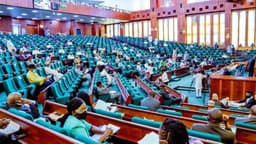
A cholera patient being attended to in a healthcare centre
A total of 4,778 people died of cholera in Nigeria between 2020 and 2024, according to data from the Nigeria Centre for Disease Control and Prevention (NCDC).
Within this year alone, over 300 deaths have been recorded, including the 179 fatalities which, according to a statement at the weekend by the Zamfara State Government, were recorded out of 12,052 suspected cases in the state as of September 2025.
Two weeks ago, Bauchi State Deputy Governor Auwal Mohammed Jatau confirmed 58 fresh deaths from 258 new cases across 14 local government areas of the state.
The surge in cholera deaths is happening despite billions of naira reportedly spent by the government and international partners to curb the waterborne disease.
These funds include annual budgetary allocations running to millions of naira; a $700 million World Bank loan secured to provide water, sanitation and hygiene (WASH) facilities across the country; $2 million United Nations’ aid; hundreds of thousands of Oral Cholera Vaccine (OCV) doses donated by the United Nations Children’s Fund (UNICEF) and the World Health Organization (WHO), among others.
Figures obtained from the NCDC showed that in 2020, the country recorded 3,513 suspected cases and 95 deaths (5.3% Case Fatality Ratio, CFR). The toll jumped sharply in 2021 with 111,062 suspected cases and 3,604 deaths across 33 states and the Federal Capital Territory.
Caused by Vibrio cholerae bacterium, cholera is an acute diarrhea infection transmitted mainly through contaminated food and water and fuelled by poor sanitation. The outbreak peaks during the rainy season, from May to October, as flooding and contaminated water sources worsen the spread. Cholera symptoms include excessive watery stooling, muscle cramps, severe dehydration and vomiting. The disease can be treated with oral rehydration solution and antibiotics, but can lead to death within hours if left untreated.
The year 2021 saw a steep jump in suspected cases to 111,062, including 3,604 deaths (3.2% CFR) from 33 states and the Federal Capital Territory, with children between 5 and 14 years of age most affected.
Bauchi, Jigawa, Kano and Zamfara states accounted for 53 percent of all cases.
In 2022, the mortality figures dropped to 592, with 2.5% CFR, out of 23,763 suspected cases reported from 32 states and the FCT, with Borno, Yobe, Katsina, Gombe, Taraba and Kano states recording 83 percent of all cases.
Of the 3,683 suspected cholera cases reported in 2023 in 31 states, 128 deaths (3.5% CFR) were recorded, with children less than five years most affected, followed by those between the ages of 5 and 14. Zamfara accounted for 25% of all suspected cases; while Cross Rivers, Katsina, Bayelsa, Ogun, Ebonyi and Niger recorded 57%.
The numbers rose again in 2024 to 10,837 suspected cases and 359 deaths (3.3% CFR) reported across the 36 states as of September 29, which was the last update by the NCDC on cholera outbreaks for that year. Also, children less than five years of age were most affected, followed by those between the ages of 5 and 14. Lagos recorded 43% of all suspected cases.
In July this year, while launching what it tagged an urgent $20 million appeal to fight cholera in Nigeria, other West African countries and Central Africa, the UNICEF regional director, Gilles Fagninou, said: “As of the end of June, Nigeria recorded 3,109 suspected cholera cases and 86 deaths across 34 states.”
He said that the number of suspected cases made Nigeria the second most affected country in West and Central Africa.
“Heavy rains, widespread flooding, and the high level of displacement are all fuelling the risk of cholera transmission and putting the lives of children at risk. Young children are particularly vulnerable to cholera due to factors such as poor hygiene, inadequate sanitation and access to safe water, and a greater risk of severe dehydration,” he stated.
How we lost them within hours – Families
What began as a pleasurable outing for Musa Aliyu’s wife and her three children ended in tears for the family after they attended a wedding ceremony in their neighbourhood in Bauchi metropolis. A few hours after they ate food at the event, they started vomiting and defecating at intervals.
“My wife and three children were infected after they ate at a marriage ceremony in Bauchi. My youngest daughter first got infected before two other children, as well as their mother,” Musa, a resident of Federal Low Cost Housing Estate, had told Daily Trust.
While others were lucky to survive the episode, 5-year-old Muhammad Aliyu succumbed. Four years on, his death has left an indelible scar on the family.
That year, 2021, in Bauchi, the disease turned Fatima’s seven children, whose father had died two years earlier, into orphans. Fatima’s sister, Anisha Saidu, who lives in the Kofar Ran area, explained that she died a few hours after she began to show symptoms of cholera.
“We were shocked by her condition because she did not show any symptoms the previous day. It was not more than four hours after she started vomiting and purging when she died. Her death threw us into mourning. She left behind seven orphans without anyone to cater for them because their father died two years ago,” Saidu revealed.
Zainab Yusuf, a mother of four from Abinsi community in Benue State, recounted how she lost one of her three children to cholera which affected four members of the family, including her, almost at the same time.
“I was diagnosed with cholera alongside three of my children. I was so worried about our health. I was unable to take care of them because we were all on admission at the same time. Unfortunately, I lost one of my children to the disease. Although I am still sad about losing my child, I am grateful to Allah for the help we got from the state government and the WHO. If not for their timely intervention, we would all have died,” she recalled.
In 2018, the late former President Muhammadu Buhari declared a state of emergency in the WASH sector by launching the National Action Plan for Revitalizing the Water Supply, Sanitation and Hygiene (WASH) sector to improve the living standards in the rural and urban areas. The plan complemented the Partnership for Expanded Water Supply, Sanitation and Hygiene (PEWASH) programme launched two years earlier to meet the Sustainable Development Goals.
Buhari said access to piped water services and improved sanitation, which stood at 32% and 38% in 1990, had declined to 7% and 29% respectively in 2015, noting that Nigeria ranked second in the global rating on open defecation, “as about 25% of our population are practicing open defecation.”
The Nigerian government in December 2021 secured a $700 million loan from the World Bank to implement water projects across the country.
The then Minister of Water Resources, Suleiman Adamu, had said: “We have been able to generate from the World Bank $700m. This money is not going to be spent by the Federal Government; it is going to the states for them to improve their water supply situation. What Nigerians need to understand is that the Federal Government is not responsible for providing water in their taps; that is the responsibility of state governments and that is why we don’t have a federal water board.”
International partners had also extended humanitarian support to Nigeria in managing cholera in recent years. The UN, through the Nigeria Humanitarian Fund, released $2 million to sustain the response to a cholera outbreak in Borno, Yobe and Adamawa in 2018.
The WHO donated 1.3 million doses of oral cholera vaccine to Bauchi in three years – 600,000 doses in 2018 and 700,000 doses in 2021 – to fight outbreaks in high-risk areas of the state.
Last year, the UNICEF also donated 600,000 doses of oral vaccine to Borno State to stem a cholera outbreak following devastating floods caused by Alau Dam collapse. The donation also included acute water diarrhea kits and hospital beds worth $69,000, said UNICEF Deputy Representative in Nigeria Rownak Khan.
At a media roundtable held in August at the Institute of Tropical Diseases Research and Prevention in Calabar, Cross River State, the Director of Cochrane Nigeria, Professor Angela Oyo-Ita, said lack of access to clean water and low public awareness are key drivers of the cholera outbreak.
Oyo-Ita, who is also a professor of Community Medicine and Chief Consultant, Public Health, University of Calabar (UNICAL), said cholera remained a major public health threat in Nigeria, especially in communities affected by poor sanitation and seasonal flooding.
“Safe water is the number one prevention against diseases. Any government that provides clean water for its people has done great. Then came vaccines. You can’t do without water,” she said.
Delivering a lecture titled “An Overview of Cholera,” a pediatric gastroenterologist at the University of Uyo Teaching Hospital, Dr. Ekong Udoh, said climate change had exacerbated cholera outbreaks, with flooding contributing to contamination of drinking water.
According to him, about 75% of infected people show no symptoms but can still spread the bacteria through their stool for up to two weeks, maintaining that while vaccination plays a crucial role in controlling outbreaks, access to clean water and sanitation remain the most effective long-term solutions to cholera.
FG’s move to crush cholera
In a renewed move against cholera, the Federal Government in February launched the National Strategic Plan of Action on Cholera Control (NSPACC) 2025-2029, with a commitment to spend $124m – with an annual budget of $20m – on eradicating cholera in Nigeria through a multi-sectoral approach.
The plan also aims to reduce annual cholera incidence and deaths by 90% and lower CFR to below 1% by 2029.
The Minister of Health and Social Welfare, Prof. Muhammad Ali Pate, represented by the Permanent Secretary of the Ministry, Ms. Daju Kachallom, had said: “Cholera has been eradicated in other parts of the world, why is it still affecting Nigeria? We must act collectively to change this reality,” he said.
Experts seek review of strategies
Experts say that to truly eliminate cholera and reduce outbreaks, there is a need for the government and other stakeholders to review their strategies and do things differently.
Dr. Rotimi Adesanya, a public health physician and Medical Director, Federal College of Education, Akoka Medical Centre, Lagos, said the government had been spending a lot on cholera management, but achieved little results, urging that community participation is crucial to scaling up impacts.
“In whatever you are doing, you have to carry the community along. They should be part and parcel of the technology or innovation you are bringing. For example, if the government puts a water closet toilet in a rural area, they may not accept it because they are not used to such things. You have to look for a kind of toilet, like a pit latrine, that is culturally acceptable to them.
A Professor of Public Health and Environmental Health at the Federal University of Technology, Owerri, Prof. Agwu Nkwa Amadi, called for a public-private partnership to provide sustainable WASH infrastructure development, such as stable water supply systems, toilets, and waste disposal mechanisms, particularly in high-risk areas.
“We also need to strengthen health systems and surveillance, improve epidemiological surveillance and early warning systems for quick detection and response, urgently employ environmental health officers and equip health centres with resources to manage cases promptly.
“There is also a need for community-led total sanitation and hygiene education; engage community health-based workers such as environmental health officers and community health environmental workers, volunteers, traditional rulers, and schools in continuous hygiene campaigns.
“The government also needs to encourage behavioural changes around hand washing, water storage, and open defecation; provide incentives; enforce penalties in communities where open defecation persists and deploy vaccines strategically in endemic and high-risk zones, combined with WASH interventions.”
Prof. Amadi further advised that cholera control must become a national development priority, not just a health sector problem, noting that cholera task forces should be established at the state level with accountability mechanisms.
“Nigeria must shift from short-term emergency responses to long-term structural solutions if it hopes to end the cycle of recurrent cholera outbreaks,” he added.
A medical doctor at Abubakar Tafawa Balewa College of Medical Sciences, Bauchi, Dr. Aminu Tukur Sulaiman, said individuals and communities must be properly sensitized to how cholera is transmitted and why they should defecate in latrines or water closets, “where these [harmful) particles cannot go into our food particles.”
“Once we control defecation, the community will be safe, because basically, when we do open defecation, especially with the rainy season, water will wash our gutters, our surroundings, and take these particles to our homes and farmlands, and then the bacteria can infect our food particles and water. Clean your gutters and ensure that water does not overflow and get into houses,” he added.
Sulaiman urged communities to practise good hand hygiene through thorough hand washing after using the toilet and before handling food or drinking water.
“Avoid eating by roadsides, particularly where there is no good sanitation and people don’t exercise good hygiene. These are things we need to avoid to ensure that we have a free cholera society,” he said. (Daily Trust)



























NEWS EXPRESS is Nigeria’s leading online newspaper. Published by Africa’s international award-winning journalist, Mr. Isaac Umunna, NEWS EXPRESS is Nigeria’s first truly professional online daily newspaper. It is published from Lagos, Nigeria’s economic and media hub, and has a provision for occasional special print editions. Thanks to our vast network of sources and dedicated team of professional journalists and contributors spread across Nigeria and overseas, NEWS EXPRESS has become synonymous with newsbreaks and exclusive stories from around the world.